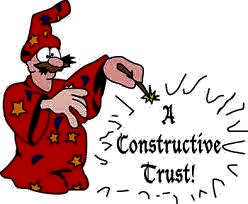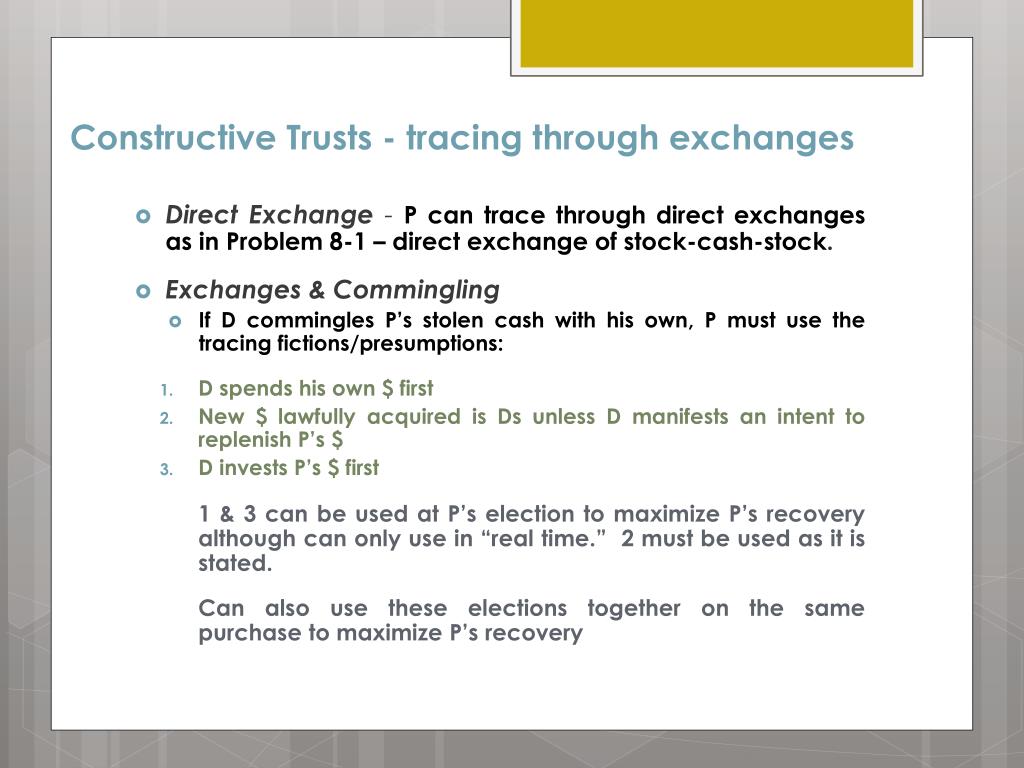An In-Depth Look at What Is A Constructive Trust and Its Relevance
An In-Depth Look at What Is A Constructive Trust and Its Relevance
Blog Article
Recognizing What Is a Constructive Count On and Its Ramifications in Lawful Matters
A positive trust fund is a nuanced legal concept designed to address circumstances where building has been gotten under scenarios that require fair intervention. This solution serves to avoid unjustified enrichment and is particularly significant in instances entailing scams, violations of fiduciary responsibility, and household law disputes. As we explore the foundational aspects of positive trusts, including their vital characteristics and applications, one have to think about the profound effects these depends on can have on residential or commercial property disputes and ownership rights, elevating vital questions regarding justice and equity in lawful contexts.
Meaning of Constructive Count On
A constructive trust fund is a lawful solution that emerges by procedure of regulation, instead than via explicit arrangement between parties. It is generally imposed by a court to attend to circumstances where one party has wrongfully acquired or holds residential or commercial property that truly comes from one more. The core principle underlying a positive trust fund is the prevention of unjust enrichment, ensuring that individuals do not benefit from their wrongful acts at the expenditure of another's legal rights.

Unlike express trusts, which are developed by the explicit purpose of the celebrations entailed, useful depends on arise from the conditions and carry out bordering the residential or commercial property concerned. This unique nature stresses the equitable considerations that courts should consider in figuring out the rightful ownership of building and ensuring justice is offered.
Key Features
Positive trusts possess several essential features that differentiate them from other kinds of residential property possession and trust fund arrangements. Mostly, constructive depends on are not established by specific agreement or formal statement; rather, they develop by operation of law to resolve circumstances of unfair enrichment or wrongful conduct. This particular stresses their therapeutic nature, usually implemented to guarantee justness and equity when one event holds property that, in justice, need to belong to an additional.
Another remarkable facet is their concentrate on the partnership in between the parties involved, commonly highlighting a fiduciary duty or a breach of depend on (What Is A Constructive Trust). Constructive counts on require a connection that triggers an obligation, such as that between companions or fiduciaries, reinforcing the honest commitment to act in the most effective rate of interest of others
In addition, the building subject to a positive depend on is generally identifiable, as it has to be particular or deducible. This recognition is important for applying the depend on and making certain that the hurt event can reclaim their rightful rate of interest. Finally, useful trusts can be used to various sorts of properties, consisting of real estate and personal effects, making them flexible tools in attending to legal disagreements.
Lawful Applications
The application of useful trusts in legal contexts is substantial and broad, commonly acting as an essential system for remedying oppressions in various circumstances. Positive depends on are usually imposed by courts to resolve scenarios where one celebration has actually wrongfully benefited at the expense of another, therefore avoiding unjust enrichment.
One key lawful application remains in instances of scams or breach of fiduciary task. For example, if a trustee misuses trust properties for individual gain, a court may impose a positive depend guarantee that the properties are gone back more to the rightful beneficiaries. This avoids the trustee from benefiting from their transgression.
Furthermore, positive trust funds matter in household regulation, particularly in divorce procedures. When one spouse has added to the acquisition of marriage home, but the title is only in the other spouse's name, a court may develop a positive depend acknowledge the non-titled spouse's equitable interest.
In addition, constructive trusts can apply in inheritance disputes, where a decedent's intentions are not reflected in the official will. In such cases, the court may impose a constructive trust to recognize the decedent's true desires. Generally, positive trust funds play an essential function in promoting justness and justice in various lawful matters.

Implications for Property Conflicts
Navigating residential or commercial property conflicts typically involves the application of useful trust funds, which can supply equitable services in complicated possession situations. When parties are taken part in a conflict over residential property, the courts may impose a constructive count on to protect against unjust enrichment and to make sure that the residential property is held for the advantage of the rightful owner, also if legal title remains in another's name.
Constructive trusts are specifically relevant in instances where there is proof of an usual intent to share residential or commercial property, such as in relationships where one celebration adds financially to an asset gotten in the various other's name. This trust works as a remedy that recognizes the payments made by Click Here one event and addresses possible discrepancies resulting from the lawful titleholder's activities.
Furthermore, useful trusts can play an essential duty in dealing with disputes emerging from fraud, misstatement, or breach of fiduciary responsibility, where one party wrongfully gets building at the cost of another. By enforcing a useful count on, courts can bring back equity and clarify possession legal rights, inevitably helping with reasonable results and decreasing the possibility of prolonged lawsuits. What Is A Constructive Trust. Thus, constructive counts on are important devices in the resolution of home conflicts, advertising justice and stability in possession issues
Exactly How to Establish a Useful Depend On
Developing a constructive count on requires demonstrating specific aspects that indicate the necessity for equitable alleviation. Mainly, a claimant must reveal that the defendant holds residential property under circumstances that require an obligation to share it to the claimant. This generally includes verifying that the property was gotten by the accused with wrongful conduct, such as scams, breach of fiduciary responsibility, or unjustified enrichment.
Furthermore, it is necessary to develop a connection between the celebrations that sustains the imposition of a constructive trust; this could consist of fiduciary relationships, joint ventures, or various other joint partnerships. The complaintant has to likewise demonstrate that they have a rightful claim to the residential property in concern, which often involves offering proof of their payment to the purchase or renovation of the property.
As soon as these elements are developed, the court can impose a useful count on as a treatment, thus permitting the plaintiff to recoup the home or its value. Inevitably, successful facility of a positive trust pivots on clear proof of the wrongful conduct and the fair concepts that necessitate such a trust fund, making certain that justice prevails in home conflicts.
Verdict
Finally, a positive trust fund serves as a crucial legal mechanism to fix situations of wrongful building purchase and stop unjustified enrichment. Its application throughout numerous legal contexts, consisting of fraud and household regulation conflicts, emphasizes its relevance in advertising equitable results. By clarifying possession rights and providing remedies for aggrieved celebrations, positive counts on enhance the stability of residential or commercial property legislation and make certain that justice dominates in complex ownership situations. Understanding their ramifications is vital for navigating legal issues efficiently.
As we explore the fundamental aspects of positive trust funds, including their vital attributes and applications, one have to think about the profound implications these counts on can have on residential property disagreements and possession rights, increasing crucial concerns regarding justice and equity in lawful contexts. What Is A Constructive Trust.
Positive depends on have numerous vital attributes that differentiate them from other types of building possession and trust fund arrangements. Positive trust funds can be applied to numerous types of assets, consisting of actual estate and individual useful source residential property, making them flexible tools in dealing with legal disputes.
If a trustee misuses trust fund possessions for individual gain, a court might impose a useful trust fund to make certain that the properties are returned to the rightful beneficiaries.In final thought, a useful trust serves as a crucial legal device to fix situations of wrongful residential property procurement and stop unfair enrichment.
Report this page